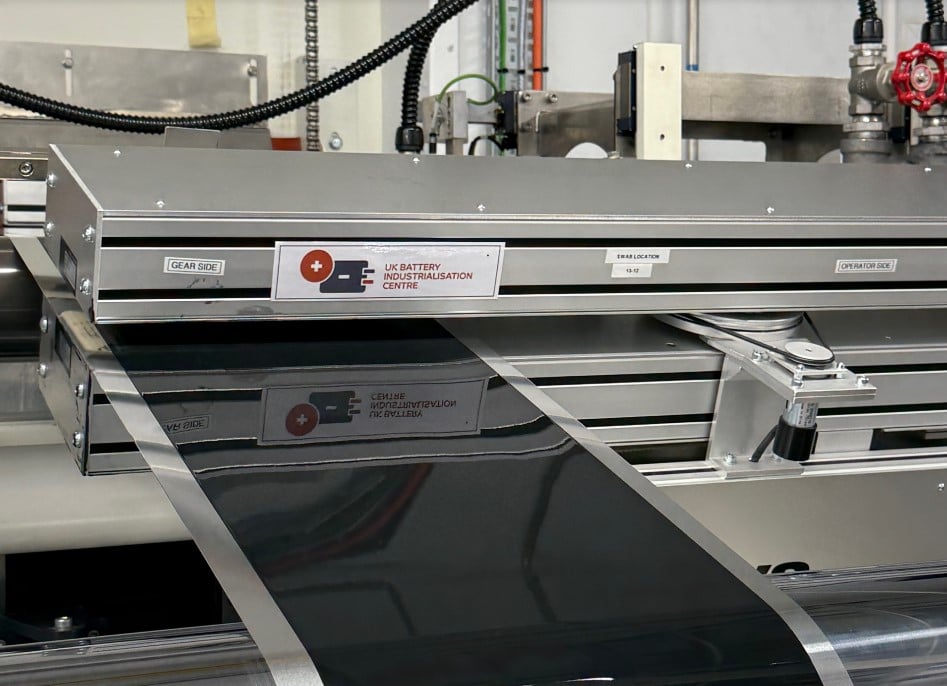Clean technology firm Altilium has collaborated with the UK Battery Industrialisation Centre (UKBIC) to create the UK’s first EV battery cells using recycled cathode active materials (CAM).
The cells were manufactured at UKIBC’s Coventry facility using Altilium’s recycled EcoCathode CAM product. The manufacturing process used to create the CAM begins by dismantling and shredding end-of-life EV batteries to create a fine powder known as “black mass”. The black mass is then put through a process that recovers over 95% of the critical minerals, including lithium, used in the creation EV batteries. These are then used to create a new, high-nickel CAM, ready to be used in a new EV battery.
Following this milestone, these batteries will undergo extensive testing with a leading original equipment manufacturer (OEM) in order to ensure they meet regulatory, performance and sustainability standards.
Previous research from Imperial College London has shown that Altilium’s recycled battery materials and match and even surpass that of virgin mined minerals in regards to battery life, charge times, and costs, and lifecycle analysis by Minviro has shown that cathode materials produced using Altiulum’s recycled materials could be as much as 74% less damaging to the environment than those using a Chinese supply chain.
While this first battery was produced at UKIBC’s facility, Altilium recently celebrated a major success for its own manufacturing process. The company’s first mini-commercial plant recently began operations in Plymouth, and plans are currently in development for a battery recycling plant in Teesside, which will have the capacity to process scrap from over 150,000 EVs each year once complete.
Dr Christian Marston, Altilium co-founder and COO, commented: “This milestone marks the first time full battery circularity has been achieved in the UK, from recovering critical minerals, including lithium, from end-of-life EV batteries and upcycling them into a high-performance cathode, to manufacturing a new battery for validation with a leading UK automotive OEM. Through this collaboration with UKBIC, we are moving beyond the emerging black mass recycling industry and ensuring that these critical battery materials remain in the domestic supply chain.”
Ameir Mahgoub, UKBIC’s head of product engineering, added: “We’re delighted to have been part of the team creating the UK’s first battery cells made using CAM containing recycled material. This pioneering project could be just the start of a journey that sees the UK becoming less reliant on imported materials and create a new market in recycled EV batteries.”
Wincanton completes trial of rapid-deployment TUAL charger
Supply chains solutions provider Wincanton has announced that it has completed a successful trial of TUAL’s rapid-deployment EV chargers.
TUAL’s PowerUp chargers, which can be deployed in as little as 15-minutes, were tested during a month-long trial in West London, to establish if the tech could support the decarbonisation of Wincanton’s fleet. The PowerUp charger enabled Wincanton to deliver an average of 4.9 high-powered DC charges per day, using an 11kW connection that previously delivered 1.2 low-powered AC charges per day.
According to the firms, this suggests that the tech could help increase available on-site EV capacity by up to 250%. Philip Clarke, CEO and founder of TUAL said: “Myself and the whole TUAL team are delighted to see Wincanton and their clients benefit from our battery-buffered DC PowerUp Charger technology – successfully delivering the dependable, cost-effective, and rapidly deployable fast charging that lies at the core of our mission.”






